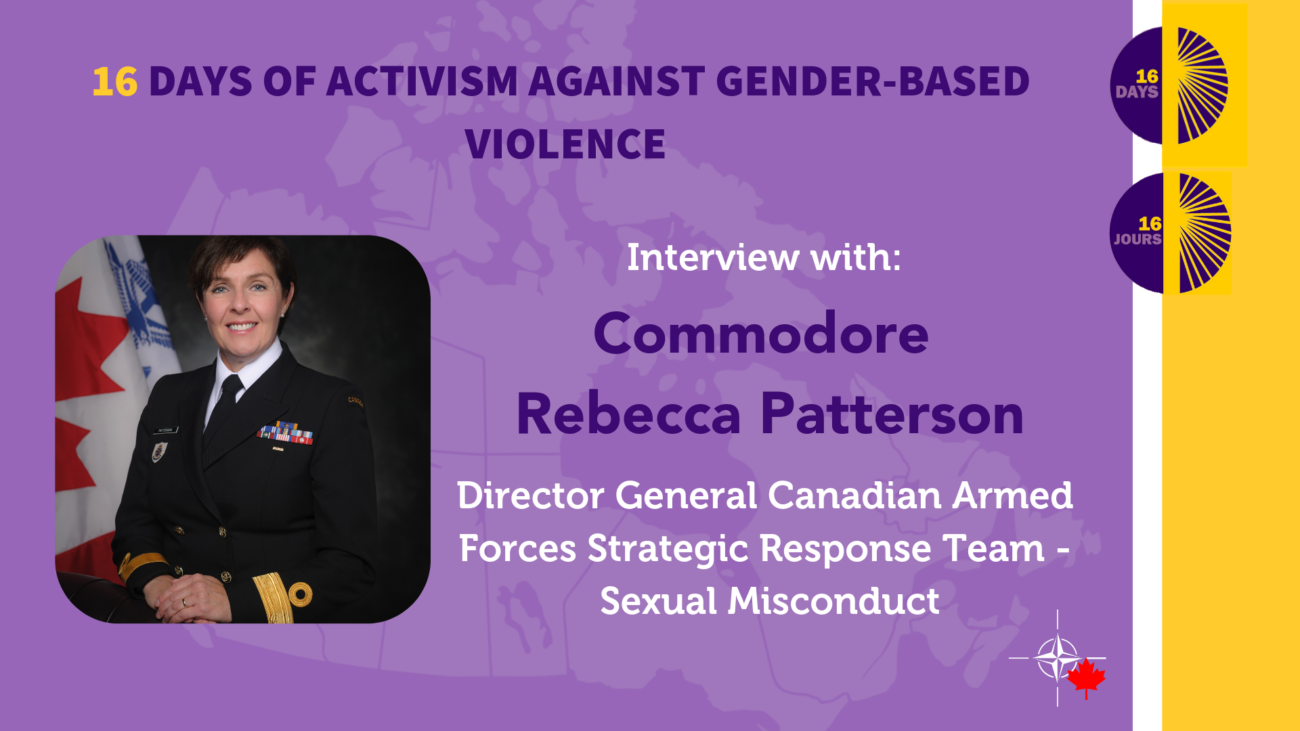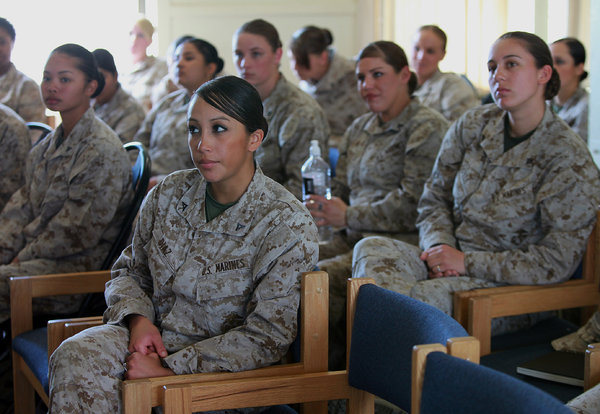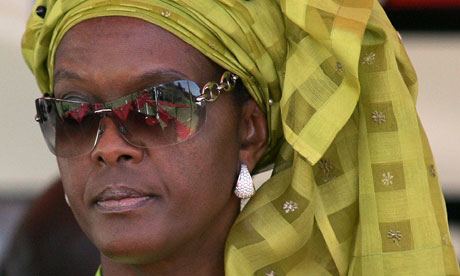Every year, from November 25th to December 10th, the NATO Association of Canada is proud to participate in the 16 Days of Activism Against Gender-Based Violence Campaign. This campaign highlights the need to address the violence that women face at all levels and in all arenas. This year, the focus is on ending gender-based violence in the workplace. This campaign provides a platform for raising awareness and it provides a forum for discussing strategies on how to effectively tackle this issue.
The NATO Association of Canada has compiled a series of interviews of some of Canada’s most high-profile women who discuss how to implement best practices in the workplace as well as the role women play in leadership positions.
About Commodore Rebecca Patterson:
Commodore Rebecca Patterson enrolled in the Canadian Armed Forces as a critical care Nursing Officer in 1989 under the Direct Entry Officer plan. She obtained her Diploma in Nursing in 1987 from Niagara College and BScN / PCNP certificate from the University of Ottawa in 1997 (Summa Cum Laude). After an occupational transfer to Health Services Operations Officer in 1998, she went on to qualify as a Certified Health Executive with the Canadian College of Health Leaders. Continuing her passion for knowledge, she graduated from the CF Command and Staff College Advanced Military Studies Course in 2004.
Commodore Patterson has had a long and rewarding career in the Canadian Armed Forces (CAF). She has worked in many different domains of healthcare which include the provision of direct patient care, delivery and leading CAF medical education and training, overseeing and directing national level medical planning in support of CAF missions at home and abroad and leading a large CAF primary care health centre. In 2012, she assumed the position of Commander of 1 Health Services Group and was responsible for the provision of healthcare to CAF personnel in the west and north of Canada. In 2016, she was appointed as the Deputy Commander, Canadian Forces Health Services Group and in 2018 was appointed to her current position as Director General, Canadian Armed Forces Strategic Response Team on Sexual Misconduct.
In true military fashion, Commodore Patterson has had the privilege of serving with the Canadian Armed Forces on overseas missions and has deployed as a member of Op SCALPEL with 1 Canadian Field Hospital during the Persian Gulf Conflict in 1991 (Saudi Arabia), Op DELIVERANCE in support of the Canadian Airborne Regiment in 1993 (Somalia), and Op ATTENTION with the NATO Training Mission – Afghanistan (Kabul) 2011-2012, where she was responsible for leading a multinational team tasked to assist the Afghan National Army and Afghan National Police to re-establish their medical education and training system. In February 2014, she was recognized for her work in Afghanistan and was awarded the Meritorious Service Medal from the Governor General of Canada and was inducted as an Officer in the Order of Military Merit in 2018.
Commodore Patterson remains an active member of the College of Nurses of Ontario, the Canadian College of Health Leaders and serves on both the Board of Directors for Health Standards Organization and Board of Directors for Soldiers Helping Soldiers. She was named as one of 12 Global Edmonton Women of Vision in 2013 and in 2014 she received the Ontario Premiers Award for Excellence in Health Sciences for Ontario College graduates.
Interview:
Julia: What do you think are some of the most effective ways of implementing best practices in the workplace?
Commodore Patterson: When implementing best practices in the workplace, it is important to leverage the strengths of your organization. For example, Operation HONOUR, which is the Canadian Armed Forces (CAF) response to sexual misconduct in our ranks, is structured as a military operation. This tried and true model draws on military structures, processes, language and tools that are familiar to CAF personnel. We also have a strong history of success in operations at home and abroad. Our goal was to use the best of our culture in order to address the worst of it.
Leadership engagement is also key to implementing best practices. Through Operation HONOUR, we have engaged personnel at every level of the organization and our highest-ranking officer (ChoD), General Vance, has made addressing sexual misconduct a top organizational priority. We are empowering our personnel to be part of the solution. Over 70,000 CAF members have received bystander training, which is designed to increase awareness and understanding and also provide personnel with strategies to prevent or stop someone from committing sexual misconduct and to support those who have been affected.
Operation HONOUR is ultimately about modifying harmful beliefs and attitudes to ensure we have a respectful culture that aligns with the Canadian Armed Forces’ ethical principles and values. Culture change of this nature takes time, and there is no proven approach to follow for an organization the size and nature of the Canadian Armed Forces. We are learning and improving as we go.
To ensure our efforts are effective and respectful of those directly affected by sexual misconduct, we work with subject matter experts and welcome independent assessment. We also regularly survey our members to assess our efforts and determine areas where we need to adjust our approach.
Julia: What are some of the things that the military is doing to eradicate sexual misconduct? Why has this been an issue in the military to begin with?
Commodore Patterson: The 2017 #MeToo movement was a keen reminder to all of us of the prevalence of sexual misconduct in our society and the Canadian Armed Forces is no exception. We had our #MeToo moment a few years earlier than most, and we are committed to addressing the problem head on.
Since Operation HONOUR was launched in 2015, we have taken significant action to: improve affected person support; seek subject matter expertise external to the CAF; initiate prevention programs; update policies; enhance subject matter expertise of counsellors and those who provide support and assistance to victims and survivors; embed Operation HONOUR concepts across all levels of education and training; hold leaders to account for their response and actions; take decisive action to deter perpetrators; and engage and empower all members of the CAF to take action to address and eliminate sexual misconduct.
The initial focus of Operation HONOUR was necessarily on the short-term goal of rapidly modifying and stopping harmful behaviours. However, now that important foundational work has been completed, we will be shifting more of our efforts towards permanently changing attitudes and beliefs with the goal of ensuring we have a culture based on trust, respect and dignity for everyone.
Affected person support has been, and will continue to be, a top priority for the CAF, and we will be significantly enhancing affected person support while developing a prevention strategy that will seek to reduce and eventually eliminate sexual misconduct. It is essential that we place affected persons and their perspectives at the centre of our response and ensure their needs guide our actions.
Victim support has been, and will continue to be, a top priority for the CAF, and we will be significantly enhancing victim support. It is essential that we place victims at the centre of our response and ensure their needs guide our actions.
Disclaimer: Any views or opinions expressed in articles are solely those of the authors
and do not necessarily represent the views of the NATO Association of Canada.




